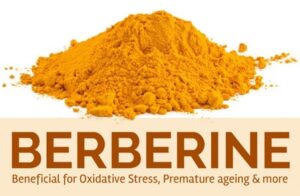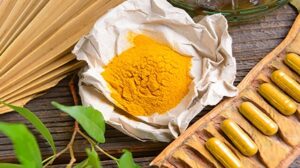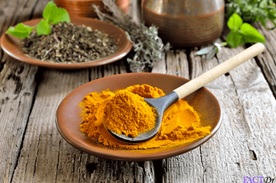BERBERINE: A SUPPLEMENT WITH MULTIPLE BENEFITS

Berberine is a natural compound found in various plants and herbs, including goldenseal, barberry, Oregon grape, and Chinese club moss. Berberine is often used as a natural dietary supplement to combat many health conditions. Research reveals Berberine to have various properties that may help support overall health, such as healthy digestive function and metabolism. And normal immune function and inflammation control. Berberine also helps manage diabetes, obesity, and other metabolic disorders by supporting healthy blood sugar levels, lowering heart disease risk, and healthy digestion. Berberine helps keep healthy metabolism by regulating insulin secretion and increasing the expression of several genes involved in fat breakdown.

Research touts Berberine as a potential therapy for many conditions. Its ability to improve blood circulation and reduce inflammation is well-known. Berberine may also help treat autoimmune diseases such as rheumatoid arthritis and psoriasis. It may also help reduce inflammation associated with diabetes and Crohn’s disease. Furthermore, Berberine may reduce inflammation in the body by inhibiting nuclear factor kappa B (NF-kB), an inflammatory molecule that plays a role in many diseases.
Berberine also appears to have antidepressant effects. In one study on mice given a high-fat diet, Berberine helped improve anxiety-like behaviour by increasing brain chemicals called neurotransmitters such as serotonin and dopamine. Another study showed that Berberine reduced depressive-like behaviour in mice with chronic mild stress (CMS). There are currently no human studies looking at the effects of Berberine on depression or other mental health conditions. However, we know that it may benefit those with type 2 diabetes due to its ability to lower blood glucose levels.
 There is adequate documentation of Berberine’s anticancer properties. In particular, Berberine has shown promise as an effective treatment for liver cancer. A few clinical studies had shown promising results in combination with other therapies. For example, a 2014 study on mice found that Berberine could effectively induce apoptosis (programmed cell death) in liver cancer cells. Berberine may also be able to target other types of cancer, including colon cancer and pancreatic cancer. Other studies have suggested that Berberine may help prevent cancer by reducing the amount of DNA damage caused by oxidative stress. Berberine appears to have the ability to prevent certain cancers by inhibiting tumour growth at the cellular level, which may explain why it has historically been used in Chinese medicine to treat cancers. As a natural compound, however, we need more research before confirming the benefits of Berberine in humans with certain cancers.
There is adequate documentation of Berberine’s anticancer properties. In particular, Berberine has shown promise as an effective treatment for liver cancer. A few clinical studies had shown promising results in combination with other therapies. For example, a 2014 study on mice found that Berberine could effectively induce apoptosis (programmed cell death) in liver cancer cells. Berberine may also be able to target other types of cancer, including colon cancer and pancreatic cancer. Other studies have suggested that Berberine may help prevent cancer by reducing the amount of DNA damage caused by oxidative stress. Berberine appears to have the ability to prevent certain cancers by inhibiting tumour growth at the cellular level, which may explain why it has historically been used in Chinese medicine to treat cancers. As a natural compound, however, we need more research before confirming the benefits of Berberine in humans with certain cancers.
MECHANISM OF ACTION OF BERBERINE
Metformin activates the AMPK pathway leading to increased metabolic rate, reduced appetite, and improved insulin sensitivity. Berberine also activates the AMPK pathway, but differently than metformin. Metformin activates AMPK when AMPK is inactive.

Berberine increases the levels of adenosine in the body. It also inhibits the enzymes responsible for breaking down adenosine in the body, thereby increasing adenosine levels. Increased adenosine levels lead to increased blood flow, improved blood sugar control, and high-fat burning, among other benefits. Berberine also blocks specific receptors in the body responsible for increasing fat storage and decreasing metabolism, thus helping one lose weight.
Berberine increases the activity of genes, which increases the production of enzymes that metabolise fat and glucose, increasing the fat-burning capacity, reducing fat absorption and lowering cholesterol and blood sugar levels. It blood lipid levels by increasing the secretion of bile acids from the liver and reduces cholesterol levels by increasing the expression of LDL receptors in the liver.
Research reveals that the Berberine administration increases the levels of GLP-1, a hormone that helps control blood sugar, by about 40% and the levels of blood sugar by about 10%. It also reduces the level of insulin, reduces the absorption of fats from the intestine, reduces the fatty acids in the liver, increases glucose uptake by muscles, increases the conversion of excess blood sugar to fat, prevents fat storage in the liver, prevents fat storage in other organs like muscles, and prevents the conversion of sugar to fat
BERBERINE FOR FATTY LIVER DISEASE
Fatty liver is a condition where your liver has too much fat stored in it, leading to a range of health issues. Thanks to its cholesterol-lowering properties, Berberine has been shown to combat fatty liver. In one study, researchers found Berberine significantly reduces cholesterol levels in patients with type 2 diabetes, which may help prevent fatty liver. As you may know, high cholesterol levels are associated with an increased risk of developing fatty liver. Doctors often advise people with high cholesterol to consider regular monitoring for signs of fatty liver, especially if they also have type 2 diabetes.
High blood sugar and high blood fat levels usually cause fatty liver. It is best to avoid high sugar and high-fat foods.  However, if you have fatty liver and high blood sugar, you may want to consider a blood sugar lowering medication. You may feel a low-fat diet and exercise if you have high blood fats.
However, if you have fatty liver and high blood sugar, you may want to consider a blood sugar lowering medication. You may feel a low-fat diet and exercise if you have high blood fats.
It is very potent in reducing the fat content in the liver and prevents the risk of developing non-alcoholic fatty liver disease. It improves the lipid profile and decreases the level of fats in the blood by increasing the metabolic rate. Moreover, it inhibits the formation of fat in the liver by increasing the production of an enzyme that breaks down fat. It also lowers the amount of sugar in the blood by decreasing the absorption of food. It is a potent herb to prevent and treat fatty liver.
ANTI-AGEING EFFECTS OF BERBERINE
Berberine helps to reduce the signs of ageing, such as wrinkles, by increasing collagen production in the skin. Collagen is the protein that keeps our skin firm and supple. As we age, the production of collagen declines, and we start to see wrinkles and saggy skin. There is proof that Berberine increases collagen production, slowing ageing and giving you a younger, firmer complexion. Berberine is also helpful for your hair, making it shinier and more robust.

It helps to reduce the signs of ageing, like wrinkles and saggy skin, by increasing the production of elastin and collagen in your skin. It also helps to fight free radicals that cause damage to your skin and make you look older.
EFFECTS OF BERBERINE ADMINISTRATION ON HUMAN MICROBIOME
Researchers have shown that Berberine has a beneficial effect on the human microbiome by increasing beneficial bacteria. Studies have shown that it might help prevent and treat certain diseases by affecting the gut microbiota. One study from 2017 enrolled 60 patients with type 2 diabetes who gave either Berberine or metformin for 12 weeks. The researchers found that both groups had similar blood sugar levels and fat metabolism decreases, but Berberine reduced blood sugar significantly more than metformin. The researchers hypothesised that this might be due to its effect on the gut microbiota, as there was an increase in the number of beneficial bacteria, such as bifidobacteria, and a decrease in the number of pathogenic bacteria.

Another study published in PLOS ONE in 2017 investigated the impact of a berberine-rich diet on the gut bacteria of Chinese adults with metabolic risk factors. Researchers found that the berberine-rich diet significantly decreased the Firmicutes/Bacteroidetes ratio in the gut microbiota, which may indicate a beneficial metabolic influence. Additionally, the berberine-rich diet significantly increased the abundance of bacteria from the genera Allobaculum, Bulleidia, and Oscillibacter compared with the control diet. Furthermore, the berberine-rich diet significantly decreased the number of bacteria from Desulfovibrio, Prevotella, and Selenomonas compared with the control diet. The results of this study suggest that a berberine-rich diet may improve metabolic health by modifying the gut microbiota.
SLEEP BOOSTING BENEFITS OF BERBERINE
In a study on the effect of Berberine on sleep in humans, healthy individuals were given 500 mg of Berberine 3 times a day for three days. Researchers told the individuals to report their sleep quality, anxiety, and stress levels before and after taking Berberine. Results showed that Berberine improved the sleep quality of individuals. There was also a stress reduction and anxiety levels, which is also helpful for better sleep.

Researchers have demonstrated the possible sleep-boosting benefits of Berberine in animal studies, but there is also research on how it affects human sleep. In a study published in the Journal of Medicinal Food in 2014, healthy adults who took 500 mg of Berberine daily for five days reported improved ease of falling asleep and a more restful sleep than those in the placebo group. Researchers believe that the herb’s active compounds, especially Berberine, might help to improve sleep and reduce insomnia risk by increasing melatonin production, lowering stress hormone secretion, and reducing anxiety.
EFFECT OF BERBERINE ON EXERCISE
The anti-inflammatory properties of Berberine make it an excellent option for athletes. The supplement reduces the risk of exercise-related injuries, improves athletic performance, and helps the body heal faster after physical activity. It can also reduce the likelihood of stress on the cardiovascular system.
The benefits of Berberine for exercise go beyond reducing inflammation. The supplement helps increase endurance and stamina and reduces muscle fatigue. It also improves blood flow to muscles and improves physical performance.
Berberine supplementation may improve several aspects of exercise performance in healthy and diseased populations by increasing endurance in healthy and unhealthy people. It has also increased muscle strength and endurance in healthy populations.
Running too fast or too far can cause a variety of health problems. These issues can include muscle injury, cardiovascular system stress, and even blood sugar control problems. Research shows that Berberine might help  prevent these problems by decreasing oxidative stress, improving blood sugar control, and reducing inflammation.
prevent these problems by decreasing oxidative stress, improving blood sugar control, and reducing inflammation.
Administration of Berberine increases the activity of AMPK, an enzyme responsible for controlling the body’s metabolism, and mediates many of the benefits of exercise. AMPK also plays a role in increasing cellular resistance to stress and repairing cellular damage from stress. When cellular stress levels are high, AMPK activity is low. By increasing cellular AMPK levels, cellular stress gets reduced, and cellular health is improved.
DOES BERBERINE BLUNT THE EFFECTS OF EXERCISE LIKE METFORMIN?
Metformin has been shown to blunt exercise in specific scenarios, though this is not something that happens in every system. There are instances when metformin has been shown to improve exercise performance, particularly in people with type 2 diabetes.

The same is true of Berberine. There is evidence that it can improve exercise performance, particularly in people who  are overweight or obese. It also seems to benefit exercise in people with type 2 diabetes, though not to the extent of metformin.
are overweight or obese. It also seems to benefit exercise in people with type 2 diabetes, though not to the extent of metformin.
There are multiple ways in which Berberine appears to improve exercise, including increasing the rate at which fat is used as fuel and decreasing the amount of glucose as fuel. It also enhances muscle sensitivity to insulin, an essential consideration for people who exercise.
It seems to improve athletic performance because Berberine stimulates the production of adenosine, a naturally-produced compound in the body that increases blood flow to muscles, improves muscle efficiency, and decreases perceptions of effort during exercise. In other words, adenosine makes exercise feel easier.
Adenosine is also an essential compound for muscle repair and recovery. Therefore, athletes and people who engage in intense or frequent exercise may benefit from Berberine even more than people who exercise for health.
Theoretically, as metformin is an insulin sensitiser, there is a chance that it could blunt the desired effects of exercise. However, there is currently no evidence to suggest that this is true. Research reveals that Berberine can improve insulin sensitivity even during exercise. Therefore, we can assume that Berberine will significantly affect exercise results more than metformin.
To date, there is no evidence that Berberine can blunt the benefits of exercise. However, there is some evidence that it could be beneficial for people who are obese or have a high body fat percentage and people who have Type 2 diabetes. For example, a study published in the International Journal of Endocrinology found that Berberine significantly reduced the amount of fat in the abdominal region compared to a placebo.
EFFECT OF BERBERINE ON SEXUAL HEALTH
Berberine is a natural product used as a metabolic regulator and anti-inflammatory agent. It may exhibit aphrodisiac properties and beneficial effects on male and female sexual health. It has been shown to increase the production of sex hormones, including testosterone, and decrease the conversion of testosterone into estrogen. Additionally, Berberine may improve sexual desire and quality of erection in men and sexual desire in women.Berberine benefits sexual desire and function in men and women by improving blood flow to the reproductive organs and testosterone levels in men and increasing estrogen levels in women. It also relieves stress and improves mood, which can further improve libido.
Berberine has potent anti-inflammatory properties as well as being a powerful AMP-activating compound. When activated, AMPs can increase nitric oxide production. Nitric oxide is critical for healthy sexual function, and one of the ways it helps is by relaxing blood vessels.
Libido is significant in sexual health, but unfortunately, it is often under-discussed. Many people suffer from a lack of libido; unfortunately, most never seek treatment for their problems.Berberine may have beneficial effects on libido in both men and women. The compound may significantly increase the volume of ejaculatory fluid in men and increase sexual desire in both sexes. Additionally, research demonstrates that Berberine can reduce the expression of specific genes involved in the proliferation of blood vessels, which is essential for penile erection and overall sexual function.
CONCLUSION
One can take Berberine in many forms, including supplements and teas. Some people take it capsule form, whereas others eat fresh or dried berries or use extracts from herbs such as goldenseal or Oregon grape root. For others, it’s best to start with a small amount and work up to larger quantities over time. The recommended dosage varies based on a person’s health needs and goals. Please pay attention to how much you’re taking (in terms of the type and dose) and when you take it (i.e., before or after meals) to obtain the most benefit. Berberine shows few adverse effects when taken within recommended doses. The recommended dose of Berberine is 500mg three times a day, one each half-hour before breakfast, lunch and dinner. Unlike pharmaceuticals, it does not carry any known drug interactions.
 Dr. K. Jayanth Murali is an IPS Officer belonging to 1991 batch. He is borne on Tamil Nadu cadre. He lives with his family in Chennai, India. He is currently serving the Government of Tamil Nadu as Director General of Police, Idol Wing CID.
Dr. K. Jayanth Murali is an IPS Officer belonging to 1991 batch. He is borne on Tamil Nadu cadre. He lives with his family in Chennai, India. He is currently serving the Government of Tamil Nadu as Director General of Police, Idol Wing CID.
